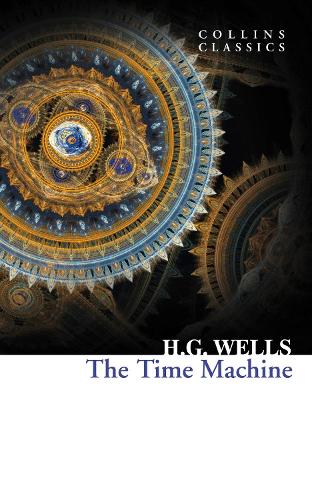
The Time Machine (Collins Classics)
(Paperback)
Publishing Details
The Time Machine (Collins Classics)
By (Author) H. G. Wells
HarperCollins Publishers
William Collins
2nd March 2017
26th January 2017
United Kingdom
Classifications
General
Fiction
Classic fiction: literary and general
Popular science
Literary studies: fiction, novelists and prose writers
Literary studies: c 1900 to c 2000
Literary theory
Performing arts genres: Science fiction, fantasy and horror
History of science
Philosophy of science
Impact of science and technology on society
823.912
Physical Properties
Paperback
144
Width 111mm, Height 178mm, Spine 9mm
80g
Description
HarperCollins is proud to present its incredible range of best-loved, essential classics.
In a moment I was clutched by several hands, and there was no mistaking that they were trying to haul me back . . . You can scarce imagine how nauseatingly inhuman they looked those pale chinless faces and great, lidless, pinkish-grey eyes!
An English scientist regales his dinner guests with the tale of his travels to the year 802,701, where he discovers that the human race has evolved into two distinct societies. The Eloi, elegant and peaceful, yet lacking spirit, are terrorised by the sinister, light-fearing Morlocks, who live underground, surrounded by industry. And when his time machine mysteriously vanishes, the scientist must descend to the realm of the Morlocks in order to find his only hope of escape . . .
H. G. Wells is considered a founding father of modern science fiction, coining the term time machine and popularising the idea of time travel in literature.
Reviews
[Wells work is] astonishingly rich in human and historical interest he foresaw the invention of, among other things, television, tanks, aerial warfare and the atom bomb David Lodge
[Wells] contrives to give over humanity into the clutches of the Impossible and yet manages to keep it down (or up) to its humanity, to its flesh, blood, sorrow, folly Joseph Conrad
I personally consider the greatest of English living writers [to be] H. G. Wells Upton Sinclair
The father of science fiction Guardian
Author Bio
Herbert George Wells's (1866-1946) career as an author was fostered by a childhood mishap. He broke his leg and spent his convalescence reading every book he could find. Wells earned a scholarship at the Norman School of Science in London. Wells's "science fiction" (although he never called it such) was influenced by his interest in biology. H. G. Wells gained fame with his first novel, The Time Machine (1895). He followed this with The Island of Dr. Moreau (1896), The Invisible Man (1897), and The War Of The Worlds (1898).
